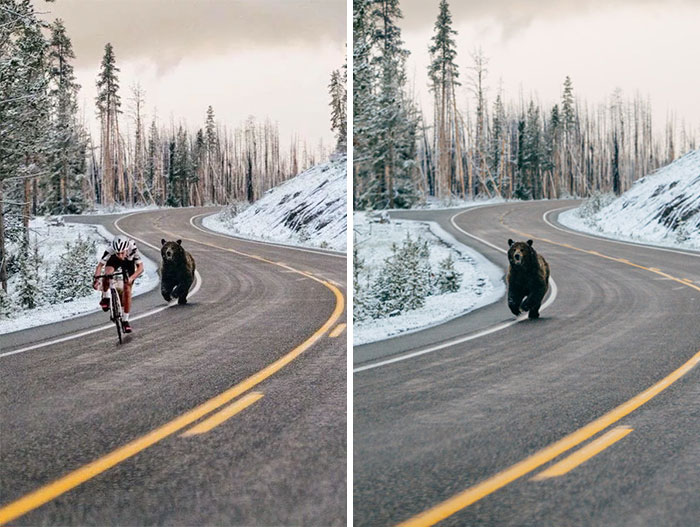
I found this image on a list of images that were determined to be fake.
1. Does it seem plausible?
2. It doesn't seem plausible. Let's check some stock photos. Which is fake, the cyclist or the bear?
3. It's possible this image is so old that the stock image won't appear on Google images anymore.
Image Citation
Unknown. (Year). Bear chasing cyclist [photograph]. Retrieved from https://www.snopes.com/fact-check/bear-chases-bike/.
Utilizing an old map and focusing on the questions below guide students through the visual literacy skills that work for primary documents:
What do you see on this map?
What are some of the cities that you see?
Is there anything familiar that you see on this map?
Who had access to this land during this time period?
What country created this map?
Whose story is not being told?
Image Citation: An Accurate Map of North and South Carolina with their Indian Frontiers, Map, England: 1775.
Just like with maps, historical photographs require greater investigation and historical context.
Example
Roger Fenton (1855). Valley of the Shadow of Death [photograph]. Retrieved from https://www.getty.edu/art/collection/objects/60602/roger-fenton-valley-of-the-shadow-of-death-english-april-23-1855.
Representation: Taken during the Crimean War in 1855, Fenton’s photograph shows cannonballs scattered across a battlefield. It is one of the earliest and most famous images of war.
Reality: The photograph was staged by the photographer. The cannonballs were originally in a ditch on the side or the road, but Fenton or his assistance scattered them across the road for greater effect.
Source: http://www.alteredimagesbdc.org/fenton

By searching the library database Artstor, we get high-quality images with the correct descriptions and colors. For example, in looking at artwork from the Sistine Chapel we know which version of an image is post-restoration and which one is prior to restoration.
The image on the left shows the fresco before it was restored. The image on the right shows what the work looks like after it was restored. You can see that the colors of the second image are more vibrant and the details are more visible.
Michelangelo Buonarroti, (1508-12). Rome: Sistine Chapel: ceiling: Prophet Zachariah. Retrieved from https://library.artstor.org/asset/ARTSTOR_103_41822000603918


In addition to inaccurate colors and dates, you might come across other misleading images. For example, the famous Mona Lisa painting has a copy likely created by an artist in Leonard da Vinci's workshop. How can you make sure you have the right image? Go to the source, the museums.
On the left is the Mona Lisa by Leonardo from the Louvre Museum, and on the right is the copy created by his apprentice now hanging in the Prado Museum.


(Left) Leonardo da Vinci, 1503-1519. Portrait Of Lisa Gherardini, Wife Of Francesco Del Giocondo, Known As The Mona Lisa. [oil on a pillar wood panel].
(Right) The Workshop of Leonardo da Vinci, 1503-1519. The Mona Lisa. [oil on walnut panel].
L'Oreal was forced to "permanently discontinued" a set of ads for several mascara brands because of excessive Photoshop editing. According to the National Advertising Division of the Council of Better Business Bureaus, which regulates advertising in the U.S., the advertisements exaggerated the effects of their products.

Maybelline / L'Oreal (2013). Maybelline Volum’ Express Falsies. [advertisement]. Retrieved from https://www.businessinsider.com/loreal-pulled-mascara-ads-because-of-photoshop-2013-3?utm_source=copy-link&utm_medium=referral&utm_content=topbar.
See additional resources:
News Services, Seattle Times. "British panel: Makeup ads go a touch too far." Seattle Times, The (WA), Fourth ed., sec. News, 28 July 2011, p. A1. NewsBank: Access World News – Historical and Current, infoweb-newsbank-com.eu1.proxy.openathens.net/apps/news/document-view?p=WORLDNEWS&docref=news/138C945317173970. Accessed 10 Sept. 2021.
KATZ, GREGORY. "Britain bans 2 misleading makeup ads." Associated Press Archive, 27 July 2011. NewsBank: Access World News – Historical and Current, infoweb-newsbank-com.eu1.proxy.openathens.net/apps/news/document-view?p=WORLDNEWS&docref=news/1390F46AC60DF128. Accessed 10 Sept. 2021.
Stewart, Colin. "Reality police crack down on Julia Roberts ad." Orange County Register, The: Blogs (Santa Ana, CA), sec. In Your Face, 29 July 2011. NewsBank: Access World News – Historical and Current, infoweb-newsbank-com.eu1.proxy.openathens.net/apps/news/document-view?p=WORLDNEWS&docref=news/138CD2F6FB777AF0. Accessed 10 Sept. 2021.
Max, Mr Theodore. "Do We Need A Truth In Advertising Act? The Industry And Retailers Self-Regulate Photoshopping Ads." Mondaq.com (UK), sec. NEWS, 22 Feb. 2018. NewsBank: Access World News – Historical and Current, infoweb-newsbank-com.eu1.proxy.openathens.net/apps/news/document-view?p=WORLDNEWS&docref=news/16A3C62B2B7A14C8. Accessed 10 Sept. 2021.
